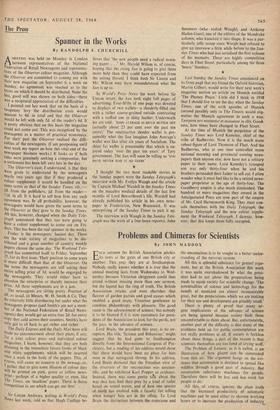Problems and Chimeras for Scientists
By JOHN MADDOX
EACH autumn the British Association pitches its tents at the gates of one British city or another. This. year they are at Southampton. Nobody really knows whether it is true that the annual meeting lasts from Wednesday to Wed- nesday because Victorian clergymen could thus attend without missing more than one sermon, but the legend has the ring of truth. The British Association retains and even cherishes that flavour of garden parties and good causes which enabled a good many Victorian gentlemen to combine philanthropy with pleasure. The good cause is 'the advancement of science,' but nobody is to be blamed if it is now customary for presi- dents of the Association to look for the perils, not the joys, in the advance of science.
Lord Brain, the president this year. is no ex- ception. His title, 'Science and Behaviour,' might suggest that he had gone to Southampton directly from the International Congress of Psy- chiatry, but a reading of his address would show that there would have been no place for him even in that variegated throng. In his address, Lord Brain declared that the Freudian view of the structure of the unconscious was unscien- tific, and he exhibited Karl Popper as evidence. Instead, there was some pretty talk about the way that bats find their prey by a kind of radar based on sound waves, and of how one species of moth has evolved with a faculty for telling when hungry bats are in the offing. To Lord Brain the distinction between the conscious and
the unconscious is to be sought in a better under- standing of the nervous system.
All this is splendid substance for genteel argu- ment, but at the British Association this week it was quite overshadowed by what the presi- dent had to say about the preparations being made to equip society for scientific change. 'The potentialities of science and technology for the benefit of mankind are almost inconceivably great, but the preparations which we are making for their use and development are pitiably small.'
There is plenty of proof that many ur- gent implications of the advance of science are being ignored because society finds them uncomfortable to think about. But, unfortunately, another part of the difficulty is that many of the problems held up for public contemplation are not really problems at all. If society is feckless about these things. a part of the reason is that scientists themselves are too fond of crying wolf.
The Problem of Leisure, as it is called, is an illustration of how gloom can be summoned from thin air. The argument hangs on the evi- dence that automation is destined to spread like wildfire through a good part of industry. But automation substitutes machines for people. Therefore there will be less and less work for people to do.
All this, of course, ignores the plain truth that the increased productivity of automatic machines can be used either to shorten working hours or to increase the production of industrt.
and thus the wealth of nations. It also overlooks the way in which the increasing prosperity of industrialised nations leads to an increasing de- mand for services—for haircuts, holidays abroad and the maintenance of television sets. In other words, if automation really spells prosperity, one of its effects will be to create employment in the occupations in which the introduction of automatic machinery is necessarily extremely difficult. In other words, the chances are that one of the most pronounced effects of automa- tion will be to change the pattern of employment, not to shorten the working week.
But none of this implies that there are no problems to be solved, but merely that the problem of leisure is a chimera. The real trouble will come because the introduction of automatic machinery will require that people should change their jobs more frequently, which implies a need that industry should look after its older em- ployees and that somebody should accept respon- sibility for retraining the others. Then—if the experience of the United States is any guide—it will become much more difficult for unskilled school-leavers to find jobs for themselves. But that, in brief, bears on the question of the school- leaving age, and on the issue of what should be done to give young people a vocational training as well as a humane education. Evidently there should be more of both commodities.
The Problem of World Population is another of those which it is customary to lay at the door of scientific advance. But here, too, public dis- cussion tends to be unreasonably dominated by prophecies of disaster. Which is not to say that disaster is impossible. The population of the world as a whole is increasing at such a rate that it promises to double in between thirty and forty years. Now there are more than 3,000. million people. If past trends continue, there will be more than 7,000 million by the end of the century. Evidently this cannot continue in- definitely. At the same time, there is no physical reason why the earth should not support 7,000 million people, or even 20,000 million.
All this implies that the absolute size of the world's population is only a problem in the very distant future—a century or so ahead. By that time there is good reason to hope that fine social mechanisms which have brought birth and death rates into some kind of equilibrium in countries such as Britain and the United States will also work in South-East Asia.
The real problems are not those of absolute size, but concern the pace of growth, and here experience is very variable. In Britain and the United States, where the population is growing faster than in the last half-century, nobody would prophesy disaster. It is only where the population is growing faster than agricultural and industrial production that hands may properly be raised in horror. But even here, of course, in India and elsewhere, it is helpful to know that present strains may be as much a sign of the transition from an agricultural to an industrialised society as a harbinger of Mal- thusian disaster. It is also important to know that the stability of population in such a country will be achieved not only by contraception, but by the encouragement of those despised bourgeois feelings that it may be better to send a few children to decent schools than a large number to an orphanage.
To make too much of these subtleties might seem to be a complacent encouragement of the pitiably meagre thought for the future that Lord Brain has been denouncing at Southampton. In reality, of course, the real problems occasioned by the advance of science and technology are formidably difficult. They will not solve them- selves. But it is important that science and tech- nology do not threaten a series of cataclysms, but rather that they have thrown up technical and political problems identical in character, if not in scale, with those with which society has been concerned for centuries. To pretend otherwise is to misrepresent science, and to paralyse the will to find socially acceptable solutions.



































 Previous page
Previous page